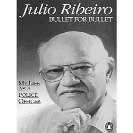Julio Ribeiro
Sukha Sipahi was the name by which a police constable who joined the terrorist ranks was known. He was caught and was in custody of the prison authorities before I joined as DGP, Punjab. He had to be produced before the court to extend his remand in judicial custody. On the prescribed date, seven policemen were assigned to escort him. When the police party neared the court premises, it was intercepted and fired upon by terrorists who were waiting to free Sukha Sipahi.
Six of the police party were killed on the spot. Sukha Sipahi escaped along with his friends who had taken part in the operation. It was a great slap on the face of Punjab Police. This incompetence was immediately questioned and the person the press approached for explanations was the DG of Police, me!
I remember that it was a guest house where the press came to meet me. In my defence, I said that I would teach my men to fight. They had been provided with weapons and ammunition. They would be conditioned to use those weapons in self defence.
The next day’s morning newspapers all carried this correct version of what I said. But a day after that, Hindustan Times, an English language paper published from Delhi, came out with bold headlines saying that the new DGP had threatened the terrorists with ‘bullet for bullet’. I had never uttered those words. Any thought of revenge would never enter my mind. But I noticed at once that my Hindu brothers and sisters in Punjab were very invigorated by the words ‘bullet for bullet’, which they believed I had uttered but which I had not.
The Sikhs as a community were not amused. Surjit Singh Barnala, the Chief Minister, summoned me to express his displeasure at what I had said but which I assured him I had not.
I had a feeling that he did not believe me and I myself was at a loss to explain how a very straight-forward statement that the police will be taught to fight back was rehashed as a statement exuding revenge.
It was only years later, after I had retired from government service, and come to live in my own home in Mumbai that I read a book by Ram Pradhan, a former Union Home Secretary with whom I had served closely both in Mumbai and in Delhi. Pradhan mentioned in his book My Years with Sonia and Rajiv that it was Arun Nehru, the Minister of State for Home, who had put these words into the mouth of the Hindustan Times correspondent during a private briefing in Delhi.
The mystery was solved as far as I was concerned, but the words ‘bullet for bullet’ stuck to me for years. Everyone I met would congratulate me on taking this very tough stand, that I would not spare anyone who dared to open fire in the course of a terrorist strike.
Though it was true that the stand I took was clearly as per the law of the land, Arun Nehru’s description of the stand as constituting an eye for an eye, a tooth for a tooth were certainly not words that had been uttered by me. I realised that I was more popular as the person who uttered those words but not used to telling untruths, I admitted to the truth.
When Penguin decided to publish my memoirs, they wanted a title and I spontaneously decided on Bullet for Bullet because I had become known by that ‘phrase’ and I felt the book would sell better if that ‘phrase’ became the title of the book.
The editor of Penguin felt likewise and so it came about that my memoirs were published under that title.
The Mumbai experience
I had a similar experience in Mumbai earlier. A notorious criminal was shot dead by the police in Wadala, to the delight of the city’s residents.
This happened a month earlier to my assuming charge of the city’s police — but every resident I encountered credited me with the distinction! I was at a loss to explain that I was then the Commissioner of the adjoining Commissionerate of Thane and also that I did not approve of the police becoming investigator, judge and executioner at the same time.
It was this note of disapproval that troubled the city’s middle class. It strongly approved the short-cuts taken by law enforcers who when under pressure of the public and the ruling politicians go after instant success and finality, which in a judicial process system that does not function as it ought to is an impossibility.
Unlock Exclusive Insights with The Tribune Premium
Take your experience further with Premium access.
Thought-provoking Opinions, Expert Analysis, In-depth Insights and other Member Only Benefits
Already a Member? Sign In Now











